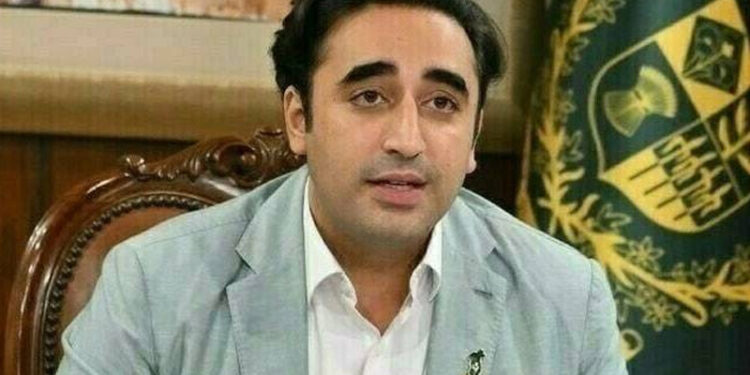New York – In a strongly worded statement made during a press conference under the auspices of the Pakistan Mission to the United Nations, Pakistan People’s Party (PPP) Chairman and former Foreign Minister Bilawal Bhutto Zardari warned that if India is inclined toward aggression, Pakistan is fully prepared to respond.
The PPP Chairman’s remarks came amid growing regional tensions and a backdrop of historically fraught relations between the two nuclear-armed neighbors. Speaking to international media representatives, Bilawal emphasized the importance of diplomacy over war, but warned against any misadventures by India.
Rising Regional Tensions: Bilawal’s Candid Response
In response to recent inflammatory rhetoric from Indian officials and media narratives suggesting potential military actions, Bilawal Bhutto Zardari was unequivocal in his stance.
“If India is keen on attacking, then Pakistan is also fully ready,” he said.
“War is not in anyone’s interest. Everyone suffers. If a nuclear conflict erupts between the two nations, its consequences will be felt across the globe.”
Bilawal’s statement reflects Pakistan’s long-standing policy of credible minimum deterrence, which has guided its nuclear doctrine since the 1998 nuclear tests. It also echoes the position that while Pakistan seeks peace, it will not compromise on national sovereignty or security.
Pakistan’s Stand Against Terrorism and India’s Role
Touching on the subject of terrorism, Bilawal Bhutto accused India of facilitating acts of terrorism within Pakistan. He stated that Pakistan possesses concrete evidence of Indian involvement in supporting terrorist activities.
“India is involved in facilitating terrorism, and there is clear evidence of this,” he said.
While he did not delve into specific incidents during the press conference, Pakistani officials in the past have shared dossiers with the United Nations and other international organizations, alleging Indian sponsorship of terrorist networks operating within Pakistan — particularly through Indian intelligence agencies.
Strong Words for Indian Leadership
Bilawal Bhutto Zardari did not hold back in criticizing Indian Prime Minister Narendra Modi, calling him:
“The butcher of Gujarat and Kashmir… a defeated person, whose statements are condemnable.”
This reference harkens back to Modi’s tenure as Chief Minister of Gujarat during the 2002 Gujarat riots, which left over a thousand people dead, mostly Muslims. Modi has also faced international scrutiny over India’s policies in Indian-administered Kashmir, especially after the revocation of Article 370 in August 2019, which stripped the region of its special constitutional status.
Emphasis on Diplomacy and Dialogue
Despite his strong words, Bilawal Bhutto Zardari reiterated Pakistan’s preference for peace and diplomacy.
“We believe in diplomacy and negotiations because world peace is in the interest of all of us,” he stated.
Bilawal underscored the need for global engagement and responsible leadership from all countries, especially those with nuclear capabilities. His remarks reflect Pakistan’s consistent messaging on international forums such as the United Nations General Assembly (UNGA) and the UN Security Council (UNSC), where Islamabad has called for peaceful conflict resolution through dialogue and multilateralism.
Kashmir at the Heart of the Conflict
The Kashmir dispute remains the core issue between India and Pakistan. Since 1947, both countries have fought three wars over the region. The situation intensified after August 5, 2019, when India revoked the special status of Jammu and Kashmir, leading to a breakdown in diplomatic ties with Pakistan.
Bilawal has been among the most vocal Pakistani politicians in advocating for Kashmiri rights and calling international attention to what Pakistan describes as Indian human rights violations in the region.
“We must continue to advocate for the people of Kashmir and ensure that their voices are not silenced,” Bilawal has previously said on international platforms.
Global Implications of an India-Pakistan Conflict
In the press conference, Bilawal Bhutto highlighted the potential global fallout of a full-scale India-Pakistan conflict, especially a nuclear one.
“A nuclear clash between India and Pakistan would not remain confined to South Asia. The entire world would face the consequences.”
Analysts have often warned that given the geographical proximity, dense population centers, and shared river systems, a conventional war escalating into a nuclear exchange would result in a humanitarian and environmental catastrophe.
A 2019 study by scientists at Rutgers University estimated that even a limited nuclear war between India and Pakistan could result in over 100 million deaths and severe climate disruption, leading to a “nuclear winter” scenario.
Pakistan’s Achievements Against Internal Terrorism
Bilawal Bhutto also took the opportunity to highlight Pakistan’s progress in combating domestic terrorism.
“Pakistan has achieved significant successes against internal terrorism,” he asserted.
In recent years, Pakistan’s military and law enforcement agencies have conducted several operations such as Zarb-e-Azb and Radd-ul-Fasaad, aimed at eliminating terrorist networks from its tribal areas and urban centers.
While challenges remain, these efforts have significantly reduced terrorist incidents compared to the volatile period of the early 2010s.
A Message of Strength and Responsibility
Bilawal’s remarks send a dual message: one of resolve and readiness in the face of aggression, and another of maturity and responsibility by advocating peace.
“Pakistan is a responsible nuclear power. We do not desire war, but we will not back down if threatened,” a senior diplomat accompanying Bilawal told journalists on the sidelines.
This balanced stance is consistent with Pakistan’s current foreign policy approach — seeking regional cooperation, strategic partnerships, and peaceful coexistence, while also drawing red lines on sovereignty and national defense.
Conclusion: A Call for Peace Amid Tensions
The press conference by Bilawal Bhutto Zardari was not only a firm response to India’s threats, but also a plea for rationality, diplomacy, and global awareness. It reminded the world that South Asia remains a nuclear flashpoint, and leaders on both sides must act with caution and wisdom.
With elections in India recently concluded, and regional dynamics shifting, the international community — including the United Nations, United States, China, and Gulf nations — will be closely monitoring developments between Pakistan and India.
As Pakistan continues to advocate for peace and sovereignty, Bilawal Bhutto Zardari’s strong but measured statements reflect a nation that seeks security through diplomacy, not aggression, but is prepared to defend itself if needed.

























